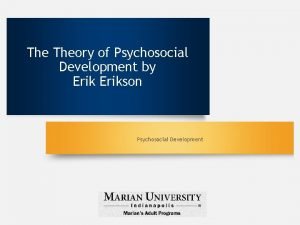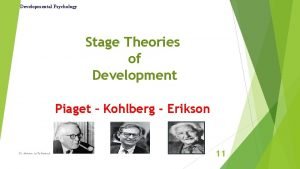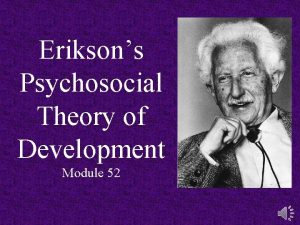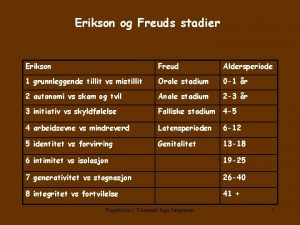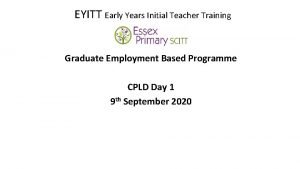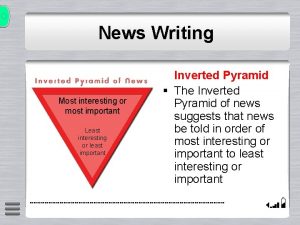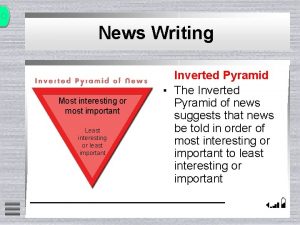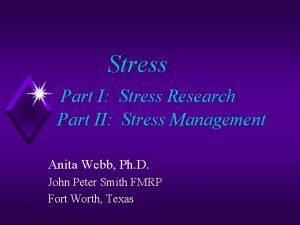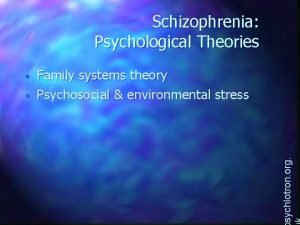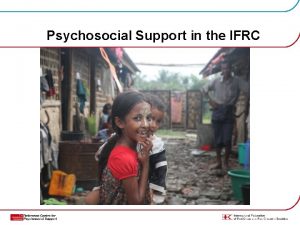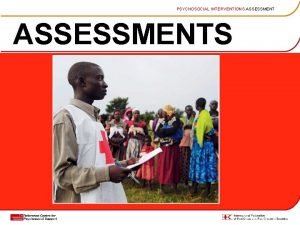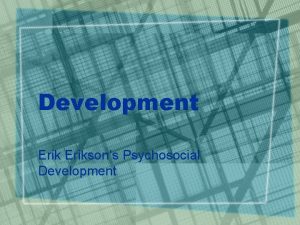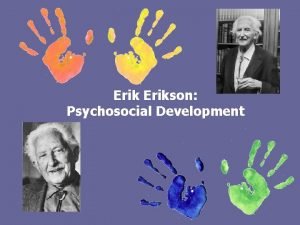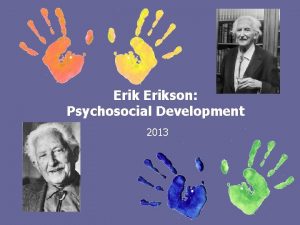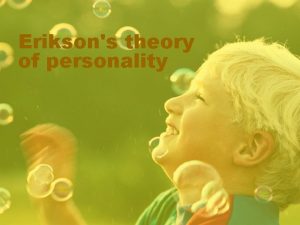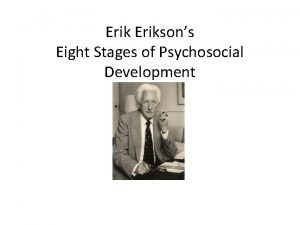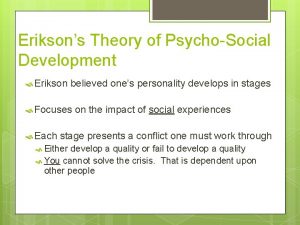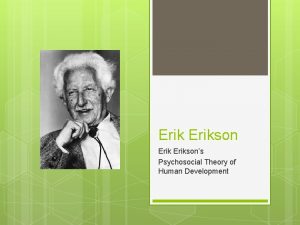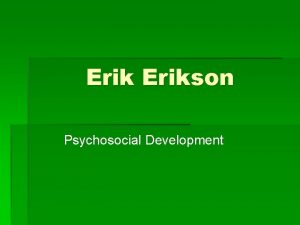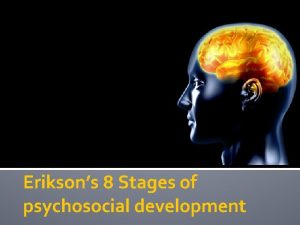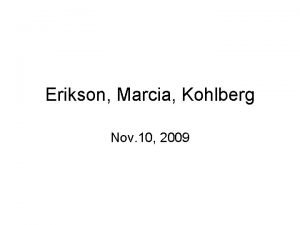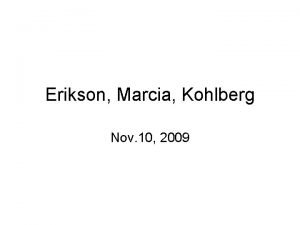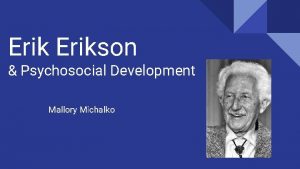Eriksons Psychosocial Theory Erikson Important Info of Erikson
















- Slides: 16

Erikson’s Psycho-social Theory

Erikson

Important Info of Erikson � Erikson was born June 15, 1902 in Frankfurt, Germany. � His mother and father had separated before his birth, He never saw his birth father or his mother's first husband. � His interest in identity was further developed based upon his own experiences in school. At his temple school, the other children teased him for being Nordic because he was tall, blonde, and blue-eyed. At grammar school, he was rejected because of his Jewish background. These early experiences helped fuel his interest in identity formation and continued to influence his work throughout his life. � When he finished high school, Erikson dabbled in art and spent some time traveling throughout Europe. At the suggestion of a friend, Erikson studied psychoanalysis and earned a certificate from the Vienna Psychoanalytic Society. � He died May 12, 1994.

Brief Summary � Erikson studied social and emotional development over the lifespan. Erikson’s theory of personality development divides the lifespan into eight basic stages. In each stage, a person faces certain conflict and challenges. In each stage, people must modify their personalities in order to adjust successfully to their social environments.

Examples � If a parent drop off their child to a daycare, the child will feel abandon because they are afraid that their parent might not come back for them. � During the second stage, Parents will Toilet Train and teach their child how to cloth themselves. � Parents will tell their child not to wet the bed and will punish them if they do.

Stages and Examples

1. Infancy: Birth-18 Months Old Basic Trust vs. Mistrust – Hope During the first and second year of life, the mother and father’s suppose to care for a child. The child will develop trust, confidence, and security if properly cared for and handled. �Social with family, shy with strangers. �Begins to show sense of humor. �Becomes aware of emotions of others.

2. Toddler / Early Childhood Years: 18 Months to 3 Years Autonomy vs. Shame – Will The second stage occurs between 18 months and 3 years. At this point, the child has an opportunity to build self-esteem and independence as he or she learns new skills and right from wrong. �Language is one of the most exciting parts of your child’s development. So your child will learn how to talk. �Learn how to climb stairs and grab a pencil to scribble.

3. Preschooler: 3 to 5 Years Initiative vs. Guilt – Purpose At this stage children wants to be like adults. they make up stories with toy phones and miniature cars, playing out roles in a trial universe, experimenting with the blueprint for what we believe it means to be an adult. � During this stage, children should be able to ride a tricycle � use safety scissors � notice a difference between girls and boys � help to dress and undress themselves � play with other children, recall part of a story, and sing a song.

4. School Age Child: 6 to 12 Years Industry vs. Inferiority – Competence During this stage, they are capable of learning, creating and accomplishing new skills and knowledge, and developing a sense of industry. 6 - to 7 -year-olds: � likes to paint and draw � rides a bike 8 - to 9 -year-olds: � jumps, skips, and chases � dresses and grooms self completely 10 - to 12 -year-olds: � remainder of adult teeth will develop � Start doing homework.

5. Adolescent: 12 to 18 Years Identity vs. Role Confusion – Fidelity The fifth stage, development depends on what is done to a person. At this point, development now depends primarily upon what a person does. They will struggle to discover and find his or her own identity, while struggling with social interactions and fitting in, and developing a sense of morality and right from wrong. � Some attempt to delay entrance to adulthood and withdraw from responsibilities � Adolescents begin to develop a strong affiliation and devotion to ideals, causes, and friends.

6. Young adult: 18 to 35 Intimacy and Solidarity vs. Isolation – Love At the young adult stage, people tend to seek for love. Some also begin to settle down and start families, although seems to have been pushed back farther in recent years. � College students at any institution of higher education � Seeking full time employment � Working full time � Married � Not married yet � Parents � Single parents � Divorced � Widow/widowers

7. Middle-aged Adult: 35 to 55 or 65 Generatively vs. Self absorption or Stagnation – Career and work are the most important things at this stage, along with family. Middle adulthood is also the time when people can take on greater responsibilities and control. � raising a family or working toward the betterment of society. � men may try to reassert their masculinity by engaging in more youthful male behaviors, such as dressing in trendy clothes, taking up activities like scuba diving, motorcycling, or skydiving

8. Late Adult: 55 or 65 to Death Integrity vs. Despair – Wisdom People may fear death as they struggle to find a purpose to their lives, wondering What was the point of life? Was it worth it? Also they will have life insurance incase death appear too soon.

Reference � Erikson, 91, Psychoanalyst Who Reshaped Views of Human Growth, Dies. (1994, May 13) The New York Times. Retrieved from http: //www. nytimes. com/1994/05/13/obituaries/erik-erikson-91 psychoanalyst-who-reshaped-views-of-human-growth-dies. html? pagewanted=all# �http: //www. learning-theories. com/eriksons-stages-ofdevelopment. html �Book: Parents and their children by Ryder & Decker Chapter 16, page 382

BY: �Amadou Deh �Boubacar Sow �Amadou Ly
 Psychosocial stages
Psychosocial stages Psychology stages of development
Psychology stages of development Erik erikson theory
Erik erikson theory Industry vs inferiority
Industry vs inferiority Erikson's psychosocial crisis
Erikson's psychosocial crisis Trust vs. mistrust
Trust vs. mistrust Freud's theory
Freud's theory Eriksons behovspyramide
Eriksons behovspyramide Erickson's psychosocial theory of development
Erickson's psychosocial theory of development Newspaper article format
Newspaper article format From most important to least important in writing
From most important to least important in writing Least important to most important
Least important to most important Relaxation response technique
Relaxation response technique Psychosocial environment
Psychosocial environment Psychosocial approach definition
Psychosocial approach definition Psychosocial information
Psychosocial information Chapter 7 human growth and development
Chapter 7 human growth and development
